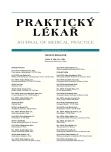-
Medical journals
- Career
Will we vaccinate against smoking?
Authors: D. Hrubá
Authors‘ workplace: Přednostka: prof. MUDr. Zuzana Derflerová Brázdová, DrSc. ; Lékařská fakulta ; Ústav preventivního lékařství ; Masarykova univerzita, Brno
Published in: Prakt. Lék. 2012; 92(7): 390-392
Category: Of different specialties
Overview
Smoking is the most important single preventable risk factor for enhanced morbidity and premature mortality. Majority of smokers develop physical and behavioural dependence, therefore smoking is chronical progressive and recidivous disease (dg. F 17). Existing smoking cessation therapies are only modestly effective. Nicotine vaccines presents a new approach for quitting. After immunization, vaccines produce antibodies binding nicotine and prevent it to reach the brain, and smoker have no pleasure response. Early clinical studies have confirmed the good tolerance and safety of vaccines, but high individual variability of immunological response. The significant increase in quit rates was observed only in group of smokers with high antibody titres. It may be estimated that nicotine vaccines are not some „wonderful drug“, but they could be other alternative part of a multifaceted approach to treating tobacco dependence.
Key words:
smoking, dependence, nicotine vaccination
Sources
1. Benowitz, N.L. Nicotine addiction. N Engl J Med 2010, 362(24). p. 2295–2303.
2. Brody, A.L., Mandelkern, M.A., London, E.D., et al. Cigarette smoking saturates brain alpha 4 beta2 nicotinic acetylcholine receptors. Arch Gen Psychiatry 2006, 63(8), p. 907–915.
3. Cornuz, J., Zwahlen, S., Jungi, W.F., et al. A vaccine against nicotine for smoking cessation: a randomized control trial. PloS ONE, 2008, 3(6), p. e2547. Dostupné na:
doi: 10.1371/journal.pone.0002547.
4. Davis, J.A., Gould, T.J. Associative learning, the hippocampus, and nicotine addiction. Curr Drug Abuse Rev 2008, 1(1), p. 9–19.
5. Dome, P., Lazary, J., Kalapos, M.P. Smoking, nicotine and neuropsychiatric disorders. Neurosci Biobehav Rev 2010, 34(3), p. 295–342.
6. Fiore, M.C., Jaén, C.R., Baker, T.B. Treating tobacco use and dependence: 2008 update. Clinical practice guideline. Rockville (MD): US Department of Health and Human Services, Public Health Service 2008.
7. Hatsukami, D.K., Jorenby, D.E., Gonzales, D., et al. Immunogenicity and smoking cessation outcomes for a novel nicotine immunotherapeutic. Clin Pharmacol Ther 2011, 89(3), p. 392–399.
8. Hughes, J.R., Keely, J., Naud, S. Shape of the relapse curve and long-term abstinence among untreated smokers. Addiction 2004, 99(1), p. 29–38.
9. LeSage, M.G., Keyler, D.E., Pentel, P.R. Current status of immunologic approaches to treating tobacco dependence: vaccines and nicotine-specific antibodies. AAPS J 2006, 8(1), p. E65–75.
10. Murtagh, J., Foerster, V. Nicotine vaccines for smoking cessation. Issues in emerging health technologies, Issue 103. Ottawa: Canadian Agency for Drugs and Technologies in Health, 2007.
11. Orson, F.M., Kinsey, B.M., Singh, R.A., et al. Substance abuse vaccines. Ann NY Acad Sci 2008, 1141, p. 257–269.
12. Raupach, T., Hoogsteder, P.H.J., (Onno) van Schayck, C.P., Constant P.
Nicotine vaccines to assist with smoking cessation. Drugs 2012, 72(4), p. e1–e16.
13. Rose, J.E. Nicotine and nonnicotine factors in cigarette addiction. Psychopharmacology (Berl) 2006, 184(3-4), p. 274–285.
14. Vocci, F.J., Chiang, C.N. Vaccines against nicotine: how effective are they likely to be in preventing smoking? CNS Drugs 2001, 15(7), p. 505-514.
15. World Health Organization. WHO Report on the global tobacco epidemic 2011; warning about the dangers of tobacco. Geneva 2011. Dostupné na: http://wholibdoc.who.int/publications/2011/9789240687813_engl.pdf.
Labels
General practitioner for children and adolescents General practitioner for adults
Article was published inGeneral Practitioner

2012 Issue 7-
All articles in this issue
-
Základy kognitivní, afektivní a sociální neurovědy
XXI. Emoce a kognitivní funkce - Bradykinin-induced angioedema and its differential diagnosis
- First experience with undergraduate teaching of assessment medicine at medical faculties
- Narrative perspective in medicine
- Will we vaccinate against smoking?
- Evaluating the validity of select fall risk assessment tools in hospitalized elderly
- Comprehensive assessment of elderly in long-term care institutions
- Sublingual allergen immunotherapy – progress in the treatment of allergic rhinitis and conjunctivitis
- So called problem prone patients
- Gender differences in food preferences in adolescents - are they projected into consumption?
-
Základy kognitivní, afektivní a sociální neurovědy
- General Practitioner
- Journal archive
- Current issue
- Online only
- About the journal
Most read in this issue- Bradykinin-induced angioedema and its differential diagnosis
- Evaluating the validity of select fall risk assessment tools in hospitalized elderly
- Sublingual allergen immunotherapy – progress in the treatment of allergic rhinitis and conjunctivitis
- So called problem prone patients
Login#ADS_BOTTOM_SCRIPTS#Forgotten passwordEnter the email address that you registered with. We will send you instructions on how to set a new password.
- Career

